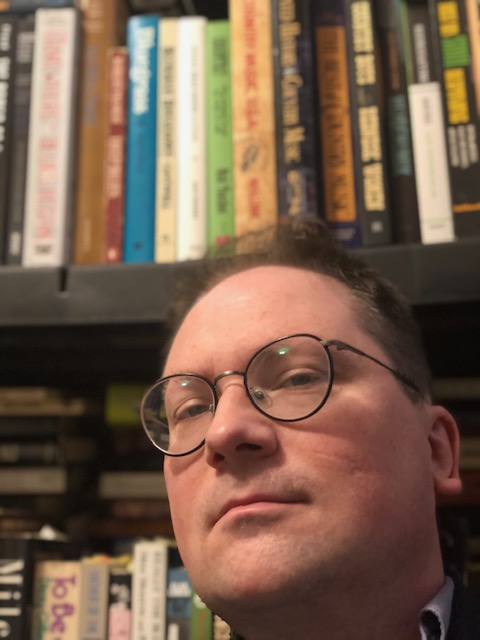Sutton finds unexpected inspiration in researching country music autobiographies
 Even though he is an English instructor at Morehead State University, Dr. Matthew Sutton has had two life-long artistic loves.
Even though he is an English instructor at Morehead State University, Dr. Matthew Sutton has had two life-long artistic loves.
Growing up in Georgetown with a father who was a high school band director for more than two decades at Scott County (Kentucky) High School, Sutton spent almost just as much time reading as he did learning to play musical instruments. Those instruments included woodwinds and percussion in his school band or acquiring a "garage-band-level competence" on instruments like guitar and bass.
Sutton followed in his father's footsteps and pursued a career in education. He attended the University of Kentucky, where he graduated with a Bachelor of Arts in English in 1994 and a Master of Arts in English in 1999. He later went on to earn a Ph.D. from the College of William and Mary in 2011.
His teaching also included an interest in research. He completed a post-doctoral appointment at East Tennessee State University, as well as research fellowships at the Harry Ransom Center at the University of Texas at Austin, the Summersell Center for the Study of the South at the University of Alabama, the New Orleans Center for the Gulf South at Tulane University, the Archives of Appalachia, and the Woody Guthrie Archives.
Sutton came to MSU in 2020 and currently teaches courses in composition and American Literature, but music still plays a massive role in what he does.
"What's probably most influential, though, is how musicianship shapes what I do as a professor," Sutton said. "When I write articles or do conference presentations, I research and refine ideas methodically, the way a musician works up a challenging new piece. When I lecture, I catch myself using phrasing and dynamics and sometimes improvising, like a player would onstage, and I work to garner responses and good classroom 'performances' from my students, like my dad would when he conducted his bands."
In some of Sutton's latest published works, his passion for music and writing have come together in interesting ways. While he had appreciated a variety of musical genres, he said he gravitated toward writing about styles of southern music. As a graduate student, country music was his dissertation topic, a choice inspired by reading country legend George Jones's autobiography "I Lived to Tell It All."
"Reading that as a first-person story left a greater impression on me than the more 'objective' works I was reading about the South," he said. "That gave me the sudden realization that these books were important primary sources and could be excellent teaching tools to convey history, especially the stories of the working classes and people of color who are often overlooked in the standard narratives about the South."
Sutton has had articles published on the jazz musician Sun Ra, soundscapes in the fiction of William Faulkner and Ernest J. Gaines, and legendary songwriter Bob Dylan's appropriation of Southern culture. His recent essays have been published in American Literature, Mississippi Quarterly, Popular Music and Society, and the edited volumes “Faulkner and Hemingway,” “Southern Comforts: Drinking & the U.S. South,” and “Swamp Souths.”
He recently wrote an article on African American country icon Charley Pride's autobiography titled "Act Naturally: Charley Pride, autobiography, and the 'accidental career'" for the book “Country Boys and Redneck Women: New Essays in Gender and Country Music.” Sutton is also in the process of turning his college dissertation into a book titled “Storyville: Discourses in Southern Musicians' Autobiographies,” which analyzes autobiographies of jazz, country, soul and blues musicians from 1900 to 1960.
"They are overlooked primary sources on the South during the years of racial segregation. It's no accident that these styles of music employ the same set of chords and share the same lyrical concerns; a lot of young southerners, black and white, crossed racial and class lines to follow strange yet eerily familiar sounds and find expressions of their own desires, even it meant defying social custom," he said. "All in all, this has been a very rewarding research topic, as I've been able to build on my scholarly and personal interests and do interdisciplinary scholarship at archives across the country."
Even though Sutton has found a great deal of satisfaction in this niche of nonfiction research and literature, he said it is all "a means to an end" to ultimately benefit MSU students.
"I'm mainly interested in the exchange of ideas, whether that means helping other scholars approach an idea in a new way and getting quoted or cited in their work or applying a concept I picked up in my research when teaching my literature or writing classes," he said. "Even if my research and teaching run on different tracks, it's important that I stay engaged and keep learning, so I can be an effective teacher."
Dr. Matthew Sutton can be reached at m.sutton@moreheadstate.edu.
To learn about MSU's Department of English, call 606-783-9448 or go to www.moreheadstate.edu/english.
